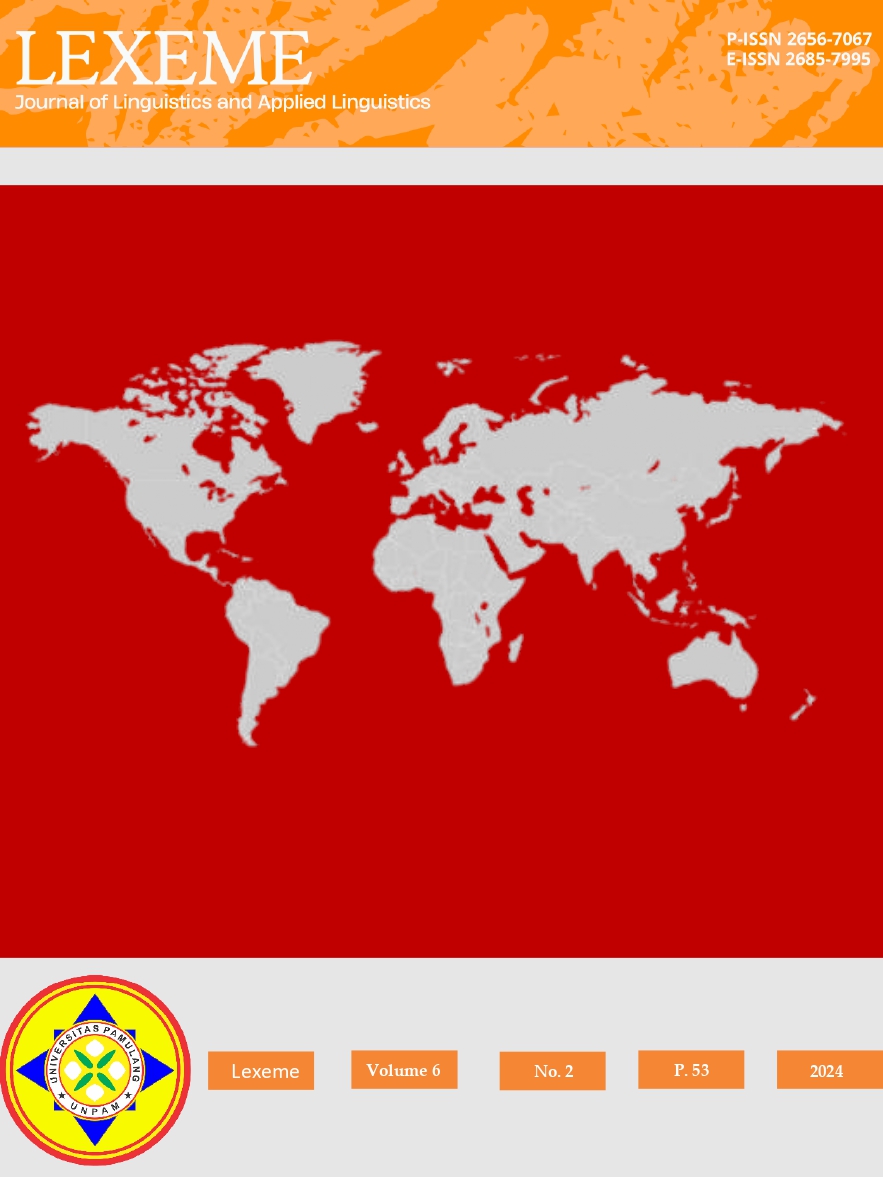Mastering Reading: Elevating Tenth Grade Comprehension with Quizizz at Senior High School
DOI:
https://doi.org/10.32493/ljlal.v6i2.40548Keywords:
application strategy, reading comprehension, QuizizAbstract
The study was aimed to increase students’ reading comprehension through Quizizz Application Strategy at the tenth grade of SMA Taman Siswa Teluk Betung Bandar Lampung, In academic year 2023-2024. The participants of the research were the researcher as a teacher, the English teacher collaborated as observer and the students of class X E- 2. The subjects of research were 34 students which consisted of 19 female and 15 male. In this research, the researcher used classroom action research design consisting of two cycle.The data was collected through observation sheet, and test. The research was focused to increase students' learning activities and students' reading comprehension. The improvement of students' learning activities showed mean score of students' learning activities in cycle I was 6,17 with the criteria was less active. While, the mean score of students' learning activities in cycle II was 7,26 with the criteria was quite active. The improvement of students' reading comprehension showed mean score in cycle I was 68,88, there were 19 students who achieved score above Minimum Mastery Criteria or 55,88%, and the mean score of cycle II was 79,26, there were 27 students who achieved score above Minimum Mastery Criteria or 76,97%. So, the improvement of students’ reading comprehension in cycle I to the cycle II was 0,25 point. From analyzing data, it could be concluded Classroom Action Research by conducting Quizizz Application Strategy Improved students' learning activities and students' reading comprehension.
References
Andeska, L., Sutiyono, A., Hastomo, T., & Angraini, N. (2021). The Correlation of Vocabulary Mastery and Reading Interest with Quick Reading Ability. IJLHE: International Journal of Language, Humanities, and Education, 4(1), 50–58.
Anggeraini, Y., Nurhasanah, & Madenta, T. (2020). EFL Learners` Reading Habit and Their Reading Comprehension Enhancement through Partner Reading. Getsempena English Education Journal , 7(2), 294–306. https://doi.org/10.46244/GEEJ.V7I2.985
Asmara, C. H., Muhammad, R. N., & Almubarokah, Q. (2022). Effect of Online Learning Using Quizizz Application to Improve English Reading Skills of Higher Education Students. JELLT (Journal of English Language and Language Teaching), 6(1), 17–29. https://doi.org/10.36597/jellt.v6i1.11964
Damiri, A., Hastomo, T., & Sari, Y. A. (2022). Visualization Strategy: An Effective Strategy to Teach Reading to Middle School Students. Seltics Journal: Scope of English Language Teaching Literature and Linguistics, 5(1), 1–8.
Erliana, S. (2011). Improving reading comprehension through directed reading-thinking activity (DRTA) strategy. Journal on English as a Foreign Language, 1(1), 49–57. https://doi.org/10.23971/JEFL.V1I1.36
Harmer, J. (2001). The Practice of English Language Teaching (3rd ed.). Longman Ltd.
Hastomo, T., & Zulianti, H. (2022). The Integration of the KWL (Know, Want, Learn) Strategy and the Zoom Conference in Teaching Reading: An Action Research. Linguists : Journal Of Linguistics and Language Teaching, 8(1), 55–66. https://doi.org/10.29300/LING.V8I1.6574
Istiara, F., & Hastomo, T. (2023). Exploring lecturers and administrative staffs’ strategies to hone EFL students’ digital literacy. JOALL (Journal of Applied Linguistics and Literature), 8(1), 151–172. https://doi.org/10.33369/JOALL.V8I1.25568
Istiara, F., Hastomo, T., Indriyanta, W. A., Pgri, S., & Lampung, B. (2023). A Study of Students’ Engagement and Students’ Speaking Skill: A Correlational Research. TEKNOSASTIK, 21(1), 1–7. https://doi.org/10.33365/TS.V21I1.2198
Konza, D. (2014). Teaching Reading: Why the “Fab Five” Should be the “Big Six” Background and Context. Australian Journal of Teacher Education, 39(12).
Niek, M. Y. W., & Abdul Aziz, A. (2022). The Use of Quizizz as an Online Teaching and Learning Assessment tool in an ESL Classroom: A Systematic Literature Review. International Journal of Academic Research in Progressive Education and Development, 11(1). https://doi.org/10.6007/IJARPED/v11-i1/11929
Nurhaya, N., & Abduh, A. (2023). Quizizz Based Application in Teaching Reading in an Indonesian EFL Junior High School Context. Tamaddun, 22(1), 65–74. https://doi.org/10.33096/tamaddun.v22i1.305
Priyanti, N. W. I., Santosa, M. H., & Dewi, K. S. (2019). EFFECT OF QUIZIZZ TOWARDS THE ELEVENTH-GRADE ENGLISH STUDENTS’ READING COMPREHENSION IN MOBILE LEARNING CONTEXT. Language and Education Journal Undiksha, 2(2). https://doi.org/10.23887/leju.v2i2.20323
Suchada Tipmontree, & Asama Tasanameelarp. (2021). Using Role Playing Activities to Improve Thai EFL Students’ Oral English Communication Skills. International Journal of Business and Society, 21(3), 1215–1225. https://doi.org/10.33736/ijbs.3345.2020
Sujarwo, A., Setiyo, B., Suhendi, S., Istiara, F., & Hastomo, T. (2023). Enhancing Reading Comprehension through The Utilization of The Summarization Strategy. Jurnal Smart, 9(2), 131–145.
Sutiyono, A., & Hastomo, T. (2022). Zoom Conference: A Study of Students’ Perception on the Academic Achievement during COVID-19 Pandemic. English Education: Jurnal Tadris Bahasa Inggris, 15(2), 193–205. https://doi.org/10.24042/ee-jtbi.v15i2.13539
Yazdani, M. M., & Mohammadi, M. (2015). The Explicit Instruction of Reading Strategies: Directed Reading Thinking Activity vs. Guided Reading Strategies. International Journal of Applied Linguistics and English Literature, 4(3), 53–60. https://doi.org/10.7575/AIAC.IJALEL.V.4N.3P.53
Yulistiani, E., Supriyono, S., Wicaksono, A., & Hastomo, T. (2020). The Correlation between Vocabulary Mastery, Reading Habits, and The Students’ Writing Ability. IJLHE: International Journal of Language, Humanities, and Education, 3(1), 69–76.
Zulianti, H., & Hastomo, T. (2022). Partner Reading Strategy : An Effective Strategy for Improving Students’ Reading Comprehension. Premise: Journal of English Education and Applied Linguistics, 11(1), 175–188. https://doi.org/10.24127/PJ.V11I1.4435
Downloads
Published
How to Cite
Issue
Section
License
Copyright (c) 2024 Sri Wahyuningsih, Wayan Satria Jaya, Maria Lovelita Vinantiastuti

This work is licensed under a Creative Commons Attribution-ShareAlike 4.0 International License.







